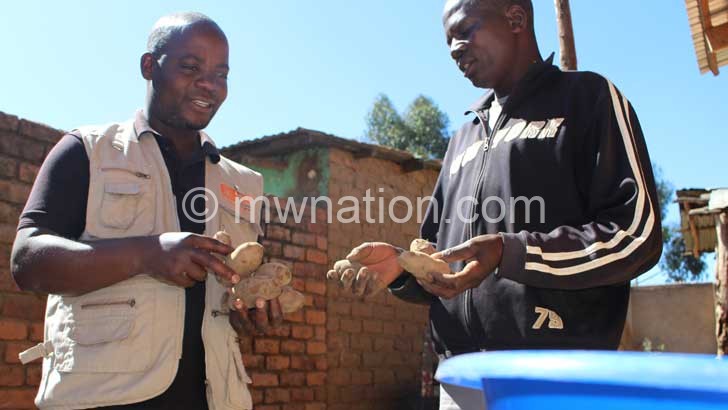Potato farmers strike gold
Fradwell Kalema says he has struck gold and is well on his path to becoming the “stinking rich” of Chongoni Hills, all from his toils from the soils of Dedza.
Quite a remarkable 24-month turnaround of this rather laid back farmer from the district well known for producing Irish potato farmers, not millionaires from their toils.
In 1993, Kalema inherited a six-acre maize field from his family and dedicated it to potato farming for the urban market in Lilongwe City.
Ever since, his yield has been falling—with the worst season being in 2018. Diminishing seed potato potency and late blight disease terrorised his farmland for decades.

Kalema’s is just one of the farming households in Malawi supported by the International Potato Centre (CIP), one of the 15 research centres of the Consultative Group on International Agricultural Research (CGIAR)—a global research consortium for a food-secure future.
“To improve food and nutritional security and generate profitable income, the project seeks to enable farmers sustainably access scientifically improved seed and expertise to manage production in varying growing seasons,” says Thoko Mvula, a CIP research technician who has worked with Kalema’s Chongoni Hills Potato Cooperative farmers for the past four years.
Mvula says the five-year project is funded by Irish Aid and implemented by CIP in partnership with the departments of agricultural extension services, nutrition, research and trade as well as the Root and Tuber Crops Development Trust.
It engages farmers to always use potato seed certified by the government to produce their own seed to ensure early planting.
The initiative also encourages the growers to follow cropping calendars, weed constantly, seek available advice to manage late blight disease throughout the growing period.
Kalema is adamant this is all it takes to strike gold from potatoes.
So far, the project has reached about 27 000 potato farmers in Thyolo, Neno, Ntcheu, Dedza, Lilongwe, Ntchisi, Dowa, Mchinji, Kasungu and Mzimba. The farmers are growing high-yielding, early-maturing, resilient and market-preferred potato varieties.
Further, quality seed potato is increasingly becoming available to these farmers, leading to improved productivity and incomes.
Recalls Kalema: “The return in 2018 wasn’t good at all even for farmers with decades of experience like myself. We didn’t have enough food.
“For years, our seed has not been enough for both winter and summer cropping and the crop was always badly diseased right on the onset of the season.”
The farmers made huge losses and some had to sell off livestock and others borrowed heavily to survive and raise funds for purchasing seed, fertilisers and other farm inputs for the next growing season.
When Kalema and his neighbours joined the CIP initiative, which seeks to enhance farmers’ access to improved and disease-free potato seed for increased productivity, they received certified seed and learned how to multiply it for the seasons to come.
Collectively, the Chongoni farmers were trained in how to better manage their age-old setbacks—late blight disease—and limit its harsh impacts on their income and nutrition.
Kalema is now free from farm inputs’ debt and loan sharks. He owns a thriving agro-dealer business and grocery shop. He has a profitable enterprise from his fast-rising potato produce and seed.
Besides, he now has better skills and knowledge to manage his life and business sustainably.
In the 2019-2020 rainy season, Kalema grew 2.5 hectares of his favourite violet potato variety from seed that he multiplied on his own.
The crop was valued at K562 500 and he spent some K600 000 on fertilisers and labour.
The farmer realised more than K9 million, which was beyond his wildest imaginations 19 months earlier.
Proud Kalema says a two-tonner vehicle is on its way, recently bought using the potato proceeds of the just-ended rainy season.
Sales continue as he still has potato seed farmers from within his village are buying as seed.
“Today, I do not just make a fortune from large volume sales from my quadrupled harvest. I make my healthy seed which is available all year round even for the current winter cropping. I can generate and multiply healthy seed for myself and my community,” says Kalema.
The author works with Root and Tuber Crops Development Trust





